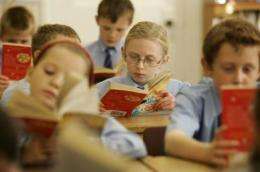Even positive stereotypes can hinder performance, researchers find

Does hearing that you are a member of an elite group – of chess players, say, or scholars – enhance your performance on tasks related to your alleged area of expertise? Not necessarily, say researchers who tested how sweeping pronouncements about the skills or likely success of social groups can influence children's performance.
The researchers found that broad generalizations about the likely success of a social group – of boys or girls, for example – actually undermined both boys' and girls' performance on a challenging activity.
The new study appears in the journal Psychological Science.
"Some children believe that their ability to perform a task is dictated by the amount of natural talent they possess for that task," said University of Illinois psychology professor Andrei Cimpian, who led the study. "Previous studies have demonstrated that this belief can undermine their performance. It is important, therefore, to understand what leads children to adopt this belief."
The researchers hypothesized that exposure to broad generalizations about the abilities of social groups induces children to believe that success depends on "natural talent." If the hypothesis were correct, then hearing messages such as "girls are very good at this task," should impair children's performance by leading them to believe that success depends primarily on innate talent and has little to do with factors under their control, such as effort.
In line with this hypothesis, two experiments with 4- to 7-year-olds demonstrated that the children performed more poorly after they were exposed to information that associated success on a given task with membership in a certain social group, regardless of whether the children themselves belonged to that group.
"These findings suggest we should be cautious in making pronouncements about the abilities of social groups such as boys and girls," Cimpian said. "Not only is the truth of such statements questionable, but they also send the wrong message about what it takes to succeed, thereby undermining achievement – even when they are actually meant as encouragement."
More information: "Who is Good at This Game? Linking an Activity to a Social Category Undermines Children's Achievement," Psychological Science.















